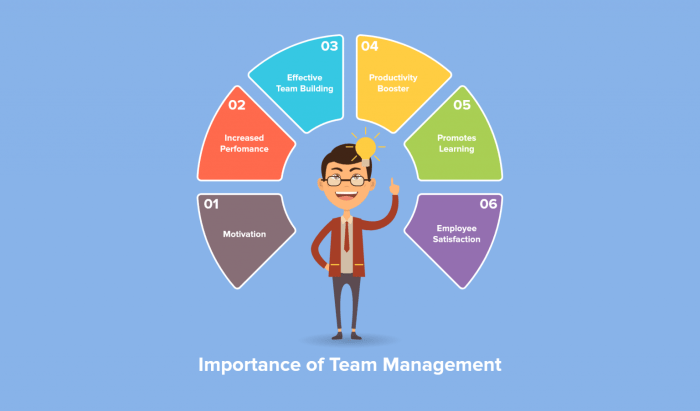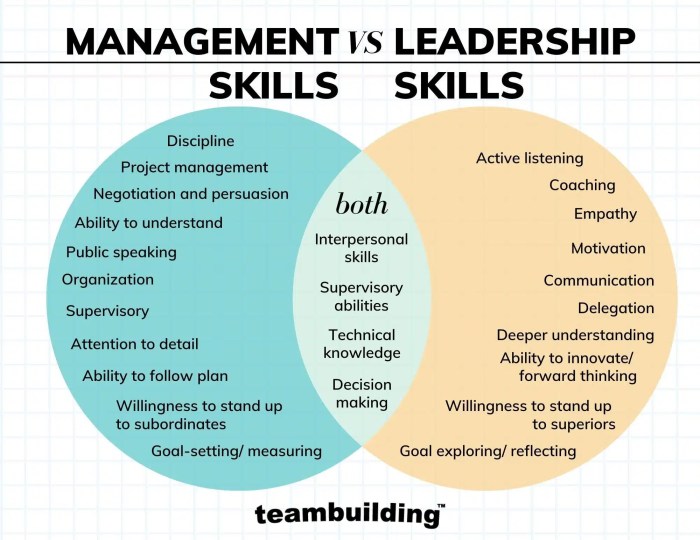Team Management Skills take center stage in the workplace, paving the way for enhanced productivity and teamwork. Get ready to dive into the world of effective leadership and collaboration, where honing these skills can make all the difference.
Importance of Team Management Skills

Effective team management skills are crucial in a work environment as they play a key role in leading, motivating, and coordinating a group of individuals towards a common goal. When team management skills are utilized effectively, they can positively impact productivity and morale within an organization.
Increased Productivity
- Clear Communication: Strong team management skills promote open and transparent communication among team members, leading to better collaboration and increased efficiency.
- Task Delegation: Effective delegation of tasks based on team members’ strengths and skills can streamline workflow and enhance productivity.
- Conflict Resolution: The ability to address conflicts and resolve issues promptly can prevent disruptions and maintain focus on project goals.
Boosted Morale
- Recognition and Appreciation: Team management skills involve recognizing and appreciating the efforts of team members, which boosts morale and fosters a positive work environment.
- Support and Guidance: Providing support and guidance to team members can enhance their confidence and motivation, leading to higher job satisfaction.
- Empowerment: Effective team management empowers team members to take ownership of their tasks and contribute actively, resulting in a sense of accomplishment and fulfillment.
Achieving Organizational Goals
- Alignment with Objectives: Team management skills help align individual efforts with organizational goals, ensuring that everyone is working towards the same overarching objectives.
- Resource Optimization: By effectively managing team resources and capabilities, organizations can maximize efficiency and achieve desired outcomes more effectively.
- Adaptability and Innovation: Strong team management fosters a culture of adaptability and innovation, enabling teams to respond proactively to challenges and drive continuous improvement.
Key Team Management Skills

Effective team management requires a diverse set of skills to ensure smooth collaboration and productivity. Let’s delve into the key skills that every team leader should possess:
Communication, Team Management Skills
Effective communication is crucial for conveying goals, expectations, and feedback to team members. By fostering open and clear communication channels, team leaders can ensure that everyone is on the same page and working towards a common objective.
Delegation
Delegation involves assigning tasks to team members based on their strengths and expertise. A good team leader knows how to delegate responsibilities effectively, empowering team members to take ownership of their work while also freeing up time for strategic planning and decision-making.
Conflict Resolution
Conflicts are inevitable in any team setting, but how they are managed can make or break a team’s success. Team leaders need to be adept at resolving conflicts in a timely and respectful manner, fostering a positive team environment where differences are addressed constructively.
Decision-making
Effective decision-making is crucial for steering the team towards its goals. Team leaders must be able to weigh different options, consider input from team members, and make informed decisions that benefit the team as a whole. By honing their decision-making skills, leaders can guide their team towards success.
Strategies for Developing Team Management Skills
Developing team management skills is crucial for effective leadership and successful teamwork. There are various methods and strategies that can help individuals enhance their abilities in managing teams effectively.
Training Programs and Workshops
Training programs and workshops are valuable resources for individuals looking to improve their team management skills. These programs provide participants with the opportunity to learn new techniques, strategies, and best practices in team management. They offer a structured learning environment where individuals can enhance their communication, problem-solving, and conflict resolution skills. By actively participating in training programs and workshops, individuals can gain valuable insights and practical knowledge that can be applied in real-world team settings.
Role of Mentorship and Coaching
Mentorship and coaching play a significant role in enhancing team management abilities. Having a mentor or coach can provide individuals with guidance, support, and feedback to help them navigate challenges and develop their leadership skills. Mentors and coaches can offer valuable insights, share experiences, and provide constructive criticism to help individuals improve their team management capabilities. By seeking mentorship and coaching opportunities, individuals can accelerate their learning and growth in team management.
Practicing and Refining Skills in Daily Interactions
One of the best ways to develop team management skills is to practice and refine them in daily work interactions. This involves actively engaging with team members, delegating tasks effectively, providing constructive feedback, and resolving conflicts in a timely manner. By consistently applying team management skills in various situations, individuals can gain valuable experience, fine-tune their strategies, and learn from both successes and failures. Practicing team management skills in daily interactions helps individuals build confidence, improve their decision-making abilities, and strengthen their relationships with team members.
Challenges in Team Management: Team Management Skills
Leading a team comes with its own set of challenges that managers need to navigate effectively in order to ensure the team’s success. From communication issues to conflicting personalities, here are some common challenges faced by managers in team management:
Communication Barriers
One of the biggest challenges in team management is communication barriers. Misunderstandings, lack of clarity, and poor communication can lead to confusion and conflicts within the team.
- Encourage open communication: Create a culture where team members feel comfortable sharing ideas and concerns.
- Use multiple communication channels: Utilize both verbal and written communication to ensure everyone is on the same page.
- Active listening: Practice active listening to understand your team members’ perspectives and address any issues effectively.
Conflict Resolution
Conflicts are inevitable when working in a team, and managers must be equipped to handle them effectively to maintain a harmonious work environment.
- Address conflicts early: Deal with conflicts as soon as they arise to prevent escalation.
- Encourage collaboration: Promote a collaborative approach to problem-solving to resolve conflicts amicably.
- Seek compromise: Help team members find common ground and reach a mutually beneficial solution.
Team Member Motivation
Keeping team members motivated and engaged can be a challenge, especially when faced with tight deadlines and high-pressure situations.
- Recognize and reward achievements: Acknowledge the hard work and achievements of team members to boost morale.
- Set clear goals: Clearly define goals and expectations to give team members a sense of purpose and direction.
- Provide opportunities for growth: Offer training and development opportunities to help team members enhance their skills and knowledge.
